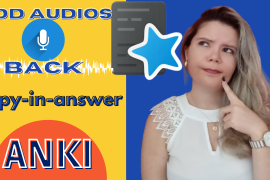This post is also available in:
 Portuguese (Brazil)
Portuguese (Brazil)
Hey there. Shirley here. In today’s article, I’m going to share with you some of the benefits of shadowing in my English learning process. Ways to shadow, how long, some of my impressions, and so on.
I believe that shadowing is one of the best and most effective ways to practice speaking English alone and, at the same time, improve your pronunciation and confidence. All you need is a phone(or any other player) and a will. 😃
What’s shadowing?
Shadowing is a practice to repeat after the speaker what they’re saying.
What to shadow?
You’re free to choose what to shadow. Here are some options:
- Podcasts
- Videos on Youtube
- Movies
- Tv series
Most of the time I use podcasts to shadow. But if you are interested in shadowing TV series or movies on Netflix, and videos on Youtube you can use the google extension called Language Reactor. I recorded a short tutorial here. 🤓
What to pay attention to?
Setting an intention is key. 🌟
Repeating after the speaker for the sake of repeating is not enough. First of all, you have to set an intention for that practice. You might set one specific intention for a week, a month, or a couple of days. You have to be aware of what you want to improve: pronunciation, connected speech, melody (rhythm), reductions, transition words, usage of the language according to the context, collocations, new words (vocabulary), and so on.
Besides intentions, it’s crucial you be present while you shadow. You’re not a parrot to repeat something without realizing what you’re saying. It’s pointless to repeat for the sake of repeating.
Ways of shadowing
You have a couple of ways to shadow. Here are three ways that I’m used to:
- Pausing and repeating after the speaker: this method is powerful because you have a break to digest the information and repeat how many times you wish.
- Pausing and repeating after the speaker following a transcription: in this case, there is a plus. in addition to having a break to digest the information and repeat how many times you wish you also can boost your vocabulary, as you can write down new words and meanings. I’m a big fan of Anki, if you are used to Anki here are many articles on how I use Anki to recall words faster
- Subvocalizing: consists of watching or listening to something and repeating after the speaker mentally. Mostly, I use this method while I’m doing other activities like driving, doing the household chores, and blowing dry my hair. When I’m doing something habitual that doesn’t require much effort from my mind. As we can’t pause and repeat after the speaker, this might be more tiring, so I set a minute or a couple of sentences (mentally) to shadow loudly or not.
How long is it for?
From my experience, no longer than 10 minutes each time is enough. More than that, we feel fed up and lose concentration.
Remember the point is to learn what you had set up to learn. So, quality is more important than quantity.
When I encounter a sentence with one of my target intentions. I pause and repeat it at least three times, exaggerating, to make it stick to my mind. 😃
Make it a habit
In order to soothe the shadowing process, it’s important you set a time to practice it daily. In other words, to make it a habit, part of your daily life. I’m used to shadowing while I’m driving and doing the dishes, mainly.
Benefits of Shadowing
Oh my goodness, this is the best part: the outcomes from this practice. 🤩
- Spoken language:
- Pronunciation
- Connected speech
- Melody (rhythm)
- Reductions
- Vocabulary:
- Learning new words and expressions
- Turning passive into active vocabulary
- Lexicon:
- Accuracy (the usage of the language according to the context)
- Collocations
- Psychologically
- Boosting your confidence
- to use words from your passive vocabulary
- to use words accurately
- Sharpening your awareness: you’ll be prone to notice the subtleties in the usage of verbs, words, and expressions. For example, one day I was listening to Better With Dr. Stephanie podcast and she said “I didn’t eat a lick of food.” Right off the bat, this “lick of” reminded me of one of my Anki cards with the following sentence “Connie … doesn’t speak a lick of English” (From the book From You Should Talk to Someone). So, you start recognizing the usage of words and expressions in real life, the way natives do. Our brain makes connections with what we are learning and with real life.
- Boosting your confidence
- Physiologically
- Training of your mouth muscles
Who to shadow
Many experts recommend you to choose one person you like the voice and the way they speak. However, choosing just one person to shadow is a hard task to tackle for me. 😅
I had tried a couple of times to shadow just one person, but I felt fed up to listen to the same kind of podcast for many times in a row. Besides, sometimes, I choose who to shadow based on the topic. Recently, I started shadowing Ramit Sethi from the podcast I Will Teach You To Be Rich because I want to enhance my financial vocabulary. So, do what works for you.
Given all this
I wonder when you’ll start shadowing. 😃
Please, let me know in the comments below whether or not you have already practiced shadowing, and if it was useful to you in which sense. How does it affect your spoken English?



